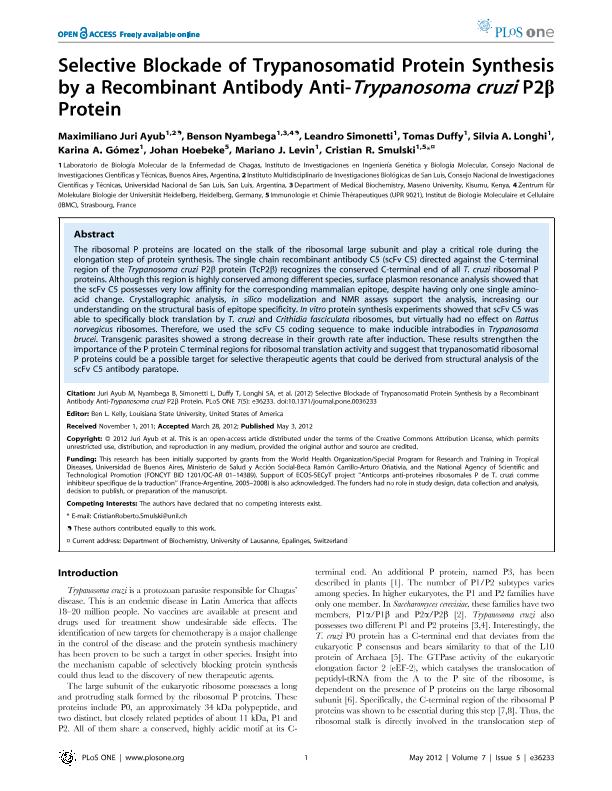Artículo
Selective blockade of trypanosomatid protein synthesis by a recombinant antibody anti-trypanosoma cruzi P2β protein
Juri Ayub, Maximiliano ; Nyambega, Benson; Simonetti, Leandro
; Nyambega, Benson; Simonetti, Leandro ; Duffy, Tomás
; Duffy, Tomás ; Longhi, Silvia Andrea
; Longhi, Silvia Andrea ; Gomez, Karina Andrea
; Gomez, Karina Andrea ; Hoebeke, Johan; Levin, Mariano Jorge
; Hoebeke, Johan; Levin, Mariano Jorge ; Smulski, Cristian Roberto
; Smulski, Cristian Roberto
 ; Nyambega, Benson; Simonetti, Leandro
; Nyambega, Benson; Simonetti, Leandro ; Duffy, Tomás
; Duffy, Tomás ; Longhi, Silvia Andrea
; Longhi, Silvia Andrea ; Gomez, Karina Andrea
; Gomez, Karina Andrea ; Hoebeke, Johan; Levin, Mariano Jorge
; Hoebeke, Johan; Levin, Mariano Jorge ; Smulski, Cristian Roberto
; Smulski, Cristian Roberto
Fecha de publicación:
05/2012
Editorial:
Public Library of Science
Revista:
Plos One
ISSN:
1932-6203
Idioma:
Inglés
Tipo de recurso:
Artículo publicado
Clasificación temática:
Resumen
The ribosomal P proteins are located on the stalk of the ribosomal large subunit and play a critical role during the elongation step of protein synthesis. The single chain recombinant antibody C5 (scFv C5) directed against the C-terminal region of the Trypanosoma cruzi P2β protein (TcP2β) recognizes the conserved C-terminal end of all T. cruzi ribosomal P proteins. Although this region is highly conserved among different species, surface plasmon resonance analysis showed that the scFv C5 possesses very low affinity for the corresponding mammalian epitope, despite having only one single amino-acid change. Crystallographic analysis, in silico modelization and NMR assays support the analysis, increasing our understanding on the structural basis of epitope specificity. In vitro protein synthesis experiments showed that scFv C5 was able to specifically block translation by T. cruzi and Crithidia fasciculata ribosomes, but virtually had no effect on Rattus norvegicus ribosomes. Therefore, we used the scFv C5 coding sequence to make inducible intrabodies in Trypanosoma brucei. Transgenic parasites showed a strong decrease in their growth rate after induction. These results strengthen the importance of the P protein C terminal regions for ribosomal translation activity and suggest that trypanosomatid ribosomal P proteins could be a possible target for selective therapeutic agents that could be derived from structural analysis of the scFv C5 antibody paratope.
Archivos asociados
Licencia
Identificadores
Colecciones
Articulos(INGEBI)
Articulos de INST.DE INVEST.EN ING.GENETICA Y BIOL.MOLECULAR "DR. HECTOR N TORRES"
Articulos de INST.DE INVEST.EN ING.GENETICA Y BIOL.MOLECULAR "DR. HECTOR N TORRES"
Citación
Juri Ayub, Maximiliano; Nyambega, Benson; Simonetti, Leandro; Duffy, Tomás; Longhi, Silvia Andrea; et al.; Selective blockade of trypanosomatid protein synthesis by a recombinant antibody anti-trypanosoma cruzi P2β protein; Public Library of Science; Plos One; 7; 5; 5-2012; 1-9; e36233
Compartir
Altmétricas



